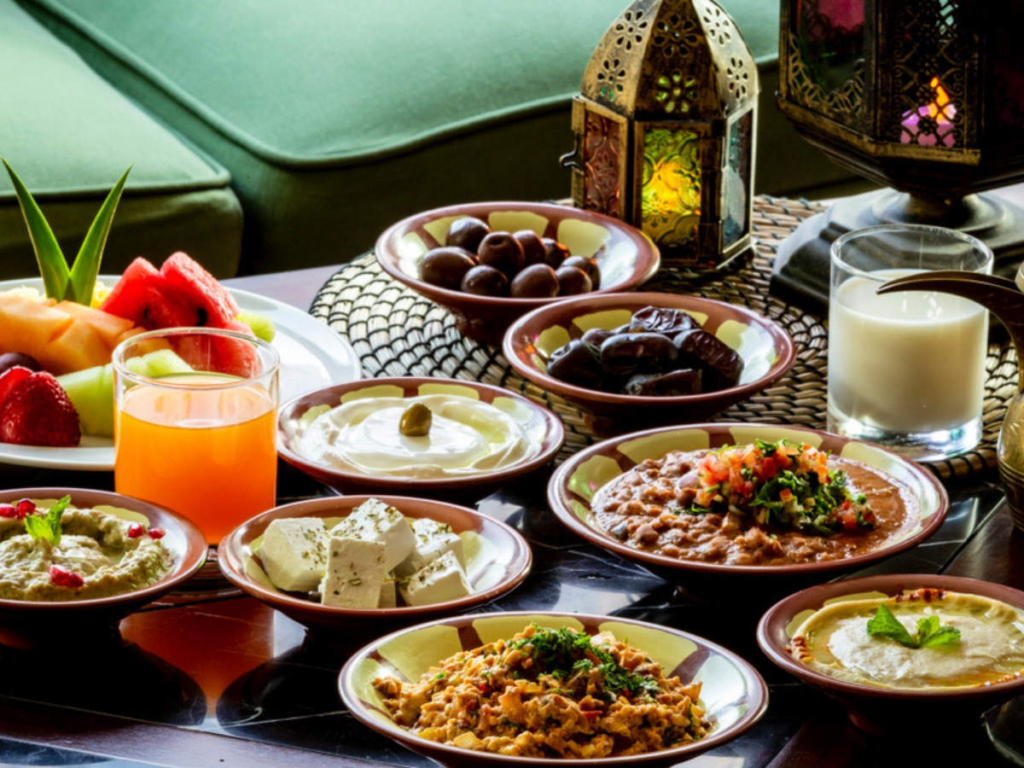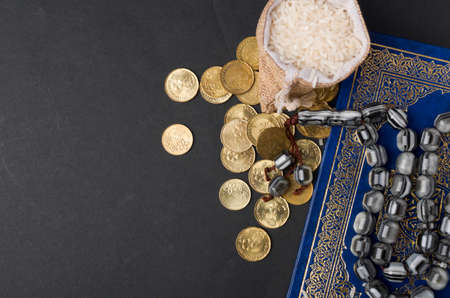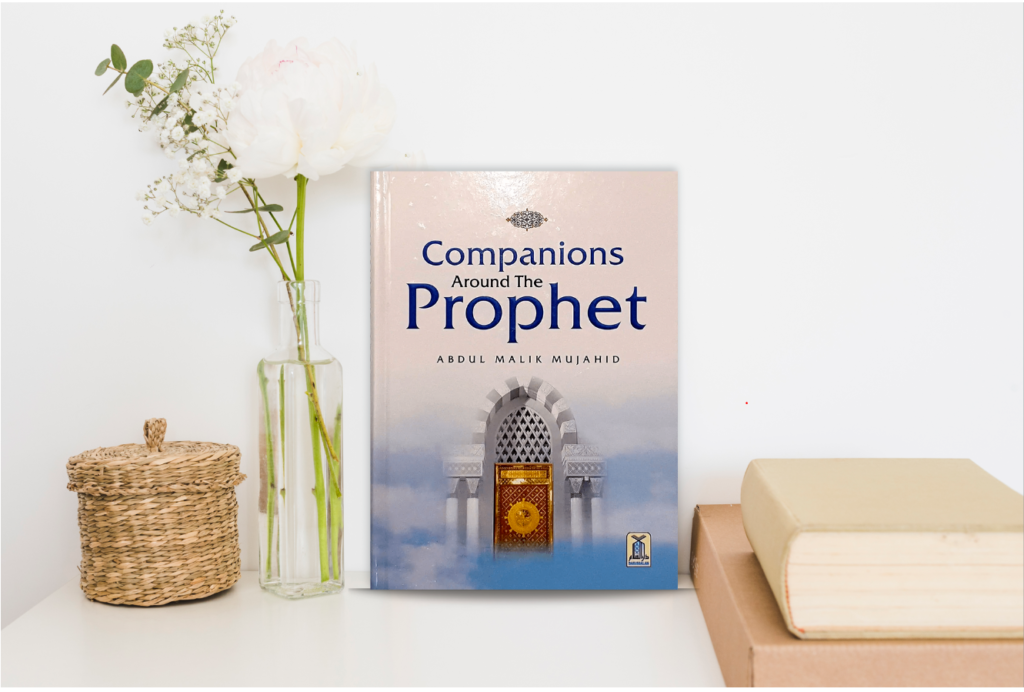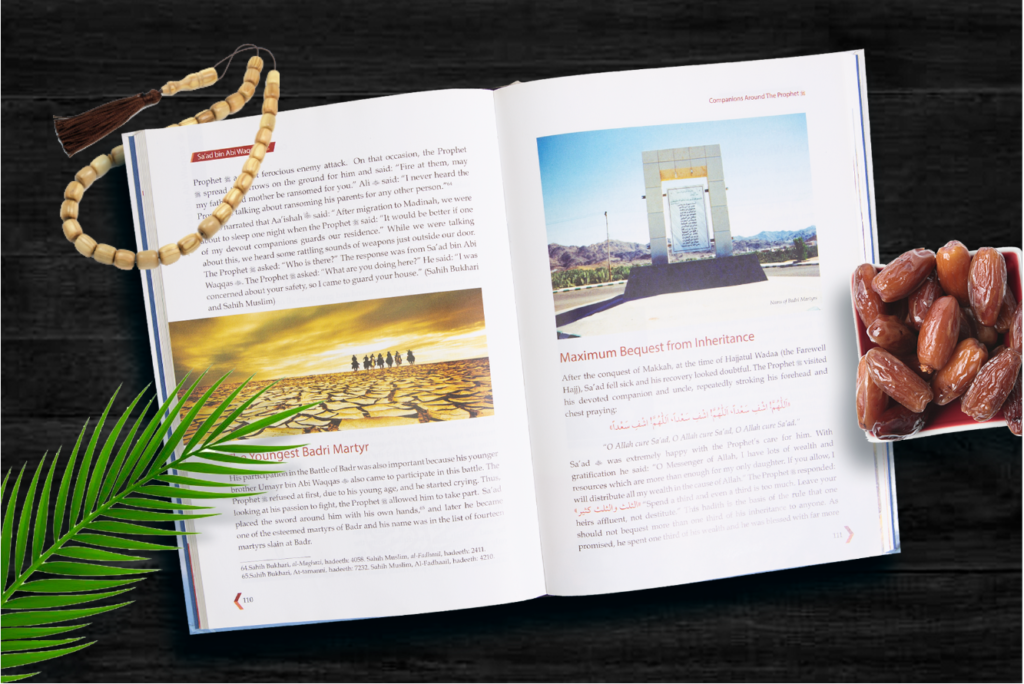How much do we know about the Prophet’s ﷺ companions? No doubt they were all of high moral character and played an instrumental role in the spread of Islam. There is so much we can learn from them just by studying their lives.
A person came to Allah’s Messenger ﷺ and said: I am hard-pressed by hunger. He sent (message) to one of his wives (to procure food for him). but she said: By Him Who has sent you with Truth, there is nothing with me (to serve him) but only water. He (the Holy Prophet ﷺ) then sent the (same) message to another, and she gave the same reply until all of them gave the same reply: By Him Who has sent thee with the Truth, there is nothing with me but only water, whereupon he (the Holy Prophet ﷺ) said: Allah would show mercy to him who will entertain this guest tonight. A person from the Ansar stood up and said: Messenger of Allah! I (am ready to entertain). He took him to his house and said to his wife: Is there anything with you (to serve the guest)? She said: No, but only subsistence for our children. He said: Distract their attention with something, and when the guest enters extinguish the lamp and give him the impression that we are eating. So they sat down. and the guest had his meal.

When it was morning he went to Allah’s Messenger ﷺ who said: Allah was well pleased with what you both did for your guest this night. (Sahih Muslim: 2054) What a beautiful story of the Prophet ﷺ and his companions. It teaches us the value and importance of guests and the treatment that the companions adopted.
When `Abdur-Rahman bin `Auf came to Medina and the Prophet ﷺ established the bond of brotherhood between him and Sa`d bin Ar-Rabi-al-Ansari, Sa`d suggested that `Abdur-Rahman should accept half of his property and family. `Abdur Rahman said, “May Allah bless you in your family and property; guide me to the market.” So `Abdur-Rahman (while doing business in the market) made some profit off some condensed dry yoghurt and butter. After a few days the Prophet ﷺ saw him wearing clothes stained with yellow perfume. The Prophet ﷺ asked, “What is this, O `Abdur-Rahman?” He said, “O Allah’s Messenger! I have married an Ansar’ woman.” The Prophet ﷺ asked, “What have you given her as Mahr?” He (i.e. `Abdur-Rahman) said, “A piece of gold, about the weight of a date stone.” Then the Prophet said, “Give a banquet, even though of a sheep.” (Sahih Bukhari: 3937)
All the Prophet’s ﷺ companions strictly wared of the things that cause Allah’s anger. That’s the way Allah declared them a standard of faith and practice in the Quran. Here is Abu Bakr رضي الله عنه who had a slave who brought him his earnings and Abu Bakr رضي الله عنه would eat from it. One day he brought him something and when Abu Bakr رضي الله عنه had eaten some of it, the slave asked him whether he knew where he had got that (food) from, Abu Bakr رضي الله عنه asked what it was, and he replied: I acted as a soothsayer for a man in the pre-Islamic period, and not being good at it, I deceived him; today he met me and he rewarded me for that soothsaying what you have eaten. Abu Bakr رضي الله عنه put his hand in his mouth and vomited up all that he had eaten. (Sahih Bukhari: 3842). Each sahaba story holds an important lesson for the Muslim Ummah.
Narrated Zaid bin Aslam: “I heard ‘Umar bin Al-Khattab رضي الله عنه saying: We were ordered by the Messenger of Allah ﷺ to give in charity, and that coincided with a time in which I had some wealth, so I said, : Today I will beat Abu Bakr, if ever I beat him.” So I came with half of my wealth, and the Messenger of Allah ﷺ said: “What did you leave for your family?” I said: “The like of it.” And Abu Bakr came with everything he had, so he said: “O Abu Bakr! What did you leave for your family?” He said: “I left Allah and His Messenger for them.” I said: ‘[By Allah] I will never be able to beat him to something.” (Tirmidhi: 3675). What a beautiful lesson on charity from the Prophet’sﷺ companion.

Abu Talha was the one among the Ansar of Medina who possessed the largest property and among his property he valued most was his garden known as Bairaha’ which was opposite the mosque, and the Messenger of Allah ﷺ often visited it and he drank of its sweet water. When this verse was revealed:
لَن تَنَالُوا۟ ٱلۡبِرَّ حَتَّىٰ تُنفِقُوا۟ مِمَّا تُحِبُّونَ
“You will never attain righteousness till you give freely of what you love” (iii. 91), Abu Talha got up and, going to Allah’s Messenger ﷺ, said: Allah says in His Book: “You will never attain righteousness till you give freely of what you love,” and the dearest of my property is Bairaha’ so I give it as Sadaqa to Allah from Whom I hope for a reward for it and the treasure with Allah; so spend it, Messenger of Allah, on whatever purpose you deem it proper. The Messenger of Allah ﷺ said: Well done! that is a profitable deal, that is a profitable deal. I have heard what you have said, but I think you should spend it on your nearest relatives. So Abu Talha distributed it among the nearest relatives and his cousins on his father’s side. (Sahih Muslim: 998). There are many other authentic sahaba stories from which Muslims can learn useful and practical lessons.
While the study of the Seerah of the Companions (رضي الله عنه ) is part of the faith of Muslims, we must also understand that the history of Islam and history of the sahaba are two names for the same thing. The rise of Muslims all over the world from the beginning to this day has been achieved by following the lives of the Prophet ﷺ’s Companions (رضي الله عنه ) and making them role models. The Holy Quran says: Do not falter or grieve, for you will have the upper hand if you are ˹true˺ believers. [آل عمران: 139]
Belief in the good character and virtue of the Sahaba (رضي الله عنه ) is the belief of Ahl-al-Sunnah wa’l-Jamaa’ah. That is because Allah has praised them in His Book and they were also praised by the Prophet (ﷺ) as it is narrated in the books of the Sunnah. These texts reach the level of mutawatir in many cases, which clearly indicates that Allah gave them special virtues and noble characteristics, by means of which they attained that great honour and high status with Him. As Allah chose for His message the most pure-hearted of His slaves (i.e., the Prophets), so too He chose as the heirs of the Prophets those who would be grateful for this blessing and who were fit for this honour (of conveying the message). This has also been proven from various authentic stories of the sahaba. Allah says:
ٱللَّهُ أَعۡلَمُ حَیۡثُ یَجۡعَلُ رِسَالَتَهُ
“Allah knows best with whom to place His Message”
(الأنعام: 124)
Imam Ibn al-Qayyim رحمه الله said: Allah knows best where to place His Message, both with regard to the original recipient and those who inherit it from him. He knows best who is fit to receive His Message and convey it to His slaves in a trustworthy and sincere manner, respect the Sender and fulfill his duties towards Him, patiently following His commands and show gratitude for His blessings, and He knows who is not fit for that. Similarly, He knows best who among the nations is fit to be the heirs of His Messengers (AS) and to succeed them and convey the Message that they received from their Lord. [Tareeq al-Hijratayn, p. 171]
And Allah also says:
وَكَذَ ٰلِكَ فَتَنَّا بَعۡضَهُم بِبَعۡضࣲ لِّیَقُولُوۤا۟ أَهَـٰۤؤُلَاۤءِ مَنَّ ٱللَّهُ عَلَیۡهِم مِّنۢ بَیۡنِنَاۤ أَلَیۡسَ ٱللَّهُ بِأَعۡلَمَ بِٱلشَّـٰكِرِینَ
“Thus We have tried some of them with others, that they might say: ‘Is it these (poor believers) whom Allah has favoured from amongst us?’ Does not Allah know best those who are grateful?”
(الأنعام: 53)
Shaykh al-Sa’di رحمه الله said: Those who acknowledge the blessing and affirm it, and who do what it requires of righteous deeds, are the ones on whom Allah bestows His blessing, to the exclusion of those who are not grateful, for Allah is wise and He does not place His bounty with one who is not qualified to receive it. Indeed these are the Prophet’s (ﷺ) companions.
Just as there are many Verses and Ahadith which speak of their virtue and high status, so too there are texts which state the reasons as to why they deserved this high status, such as the verse in which Allah says:
مُّحَمَّدࣱ رَّسُولُ ٱللَّهِۚ وَٱلَّذِینَ مَعَهُۥۤ أَشِدَّاۤءُ عَلَى ٱلۡكُفَّارِ رُحَمَاۤءُ بَیۡنَهُمۡ تَرَىٰهُمۡ رُكَّعࣰا سُجَّدࣰا یَبۡتَغُونَ فَضۡلࣰا مِّنَ ٱللَّهِ وَرِضۡوَ ٰنࣰا سِیمَاهُمۡ فِی وُجُوهِهِم مِّنۡ أَثَرِ ٱلسُّجُودِۚ ذَ ٰلِكَ مَثَلُهُمۡ فِی ٱلتَّوۡرَىٰةِۚ وَمَثَلُهُمۡ فِی ٱلۡإِنجِیلِ كَزَرۡعٍ أَخۡرَجَ شَطۡـَٔهُۥ فَـَٔازَرَهُۥ فَٱسۡتَغۡلَظَ فَٱسۡتَوَىٰ عَلَىٰ سُوقِهِۦ یُعۡجِبُ ٱلزُّرَّاعَ لِیَغِیظَ بِهِمُ ٱلۡكُفَّارَۗ وَعَدَ ٱللَّهُ ٱلَّذِینَ ءَامَنُوا۟ وَعَمِلُوا۟ ٱلصَّـٰلِحَـٰتِ مِنۡهُم مَّغۡفِرَةࣰ وَأَجۡرًا عَظِیمَۢا
“Muhammad is the Messenger of Allah. And those who are with him are severe against disbelievers, and merciful among themselves. You see them bowing and falling down prostrate (in prayer), seeking Bounty from Allah and (His) Good Pleasure. The mark of them (i.e. of their Faith) is on their faces (foreheads) from the traces of prostration (during prayers). This is their description in the Tawrat (Torah). But their description in the Injeel (Gospel) is like a (sown) seed which sends forth its shoot, then makes it strong, and becomes thick and it stands straight on its stem, delighting the sowers, that He may enrage the disbelievers with them.

Allah has promised those among them who believe (i.e. all those who follow Islamic Monotheism, the religion of Prophet Muhammad till the Day of Resurrection) and do righteous good deeds, forgiveness and a mighty reward (i.e. Paradise)”
(الفتح: 29)
Among the greatest reasons for the high status of the Prophet’s (ﷺ) companions (رضي الله عنه ) is that Allah bore witness to their purity of heart and sincere faith. That is a mighty testimony from the Lord of mankind, which no human being can attain after the cessation of the Revelation.
Read these Allah’s words carefully:
لَّقَدۡ رَضِیَ ٱللَّهُ عَنِ ٱلۡمُؤۡمِنِینَ إِذۡ یُبَایِعُونَكَ تَحۡتَ ٱلشَّجَرَةِ فَعَلِمَ مَا فِی قُلُوبِهِمۡ فَأَنزَلَ ٱلسَّكِینَةَ عَلَیۡهِمۡ وَأَثَـٰبَهُمۡ فَتۡحࣰا قَرِیبࣰا
“Indeed, Allah was pleased with the believers when they gave the Bay‘ah (pledge) to you (O Muhammad) under the tree, He knew what was in their hearts, and He sent down As‑Sakeenah (calmness and tranquillity) upon them, and He rewarded them with a near victory”
(الفتح: 18)
Ibn Kathir رحمه الله said in Tafseer al-Qur’aan al-‘Azeem:
“He knew what was in their hearts” i.e., of sincerity and loyalty, and the willingness to hear and obey.
How beautiful are the words of ‘Abd-Allah ibn Mas’ud رضي الله عنه: “Whoever among you wishes to follow (someone), let him follow one who has died, for the one who is still alive is not safe from fitnah. The Prophet’s (ﷺ) companions were the best of this ummah, the most righteous of heart and the deepest in knowledge and the most straightforward, people whom Allah chose to accompany His Prophet (ﷺ) and establish His religion. So acknowledge their virtue and follow in their footsteps, and adhere as much as you can to their morals and religion, for they were following the right guidance.
(جامع بیان العلم وفضله: 1810)
Allah promised Paradise and eternal bliss to the Muhaajireen and Ansaar, and He stated that He is pleased with them in verses that will be recited until the Day of Resurrection. Can anyone think that this would be given to one who does not deserve that bounty?
The Holy Quran reveals to us the authority of the Prophet’s (ﷺ) companions رضي الله عنه in Islam in these words:
وَٱلسَّـٰبِقُونَ ٱلۡأَوَّلُونَ مِنَ ٱلۡمُهَـٰجِرِینَ وَٱلۡأَنصَارِ وَٱلَّذِینَ ٱتَّبَعُوهُم بِإِحۡسَـٰنࣲ رَّضِیَ ٱللَّهُ عَنۡهُمۡ وَرَضُوا۟ عَنۡهُ وَأَعَدَّ لَهُمۡ جَنَّـٰتࣲ تَجۡرِی تَحۡتَهَا ٱلۡأَنۡهَـٰرُ خَـٰلِدِینَ فِیهَاۤ أَبَدࣰاۚ ذَ ٰلِكَ ٱلۡفَوۡزُ ٱلۡعَظِیمُ
“And the foremost to embrace Islam of the Muhaajiroon and the Ansaar and also those who followed them exactly (in Faith). Allah is well-pleased with them as they are well-pleased with Him. He has prepared for them Gardens under which rivers flow (Paradise), to dwell therein forever. That is the supreme success”
And the Holy Prophet (ﷺ) commanded us:
فَعَلَيْكُمْ بِسُنَّتِي وَسُنَّةِ الْخُلَفَاءِ الرَّاشِدِينَ الْمَهْدِيِّينَ عَضُّوا عَلَيْهَا بِالنَّوَاجِذِ
I urge you to adhere to my Sunnah and the path of the Rightly-Guided Caliphs, and cling stubbornly to it.
(ابن ماجه: 42)
So, all the Muslims are obliged to study the Seerah of the Prophet’s (ﷺ) companions and spend their lives according to their lives.
The Messenger of Allah (ﷺ) said:
لاَ تَسُبُّوا أَصْحَابِي، فَلَوْ أَنَّ أَحَدَكُمْ أَنْفَقَ مِثْلَ أُحُدٍ ذَهَبًا مَا بَلَغَ مُدَّ أَحَدِهِمْ وَلاَ نَصِيفَهُ
“Do not abuse my companions for if any one of you spent gold equal to Uhud (in Allah’s Cause) it would not be equal to a Mud or even a half Mud spent by one of them.”
(صحيح البخاري: 3673)
Since this topic is so important, over the years Darussalam has published numerous books on this topic which have been widely read and appreciated. On the very same topic, there is a well-appreciated book with the title Companions Around the Prophet ﷺ which was written and published by Maulana Abdul Malik Mujahid and contains both biographies and authentic sahaba stories.

Abdul Malik Mujahid is a pak-suadi citizen, the author of dozens of Islamic books, the owner of Darussalam International, chairman of Darussalam Educational System Pakistan and president of Markazi Jamiat Ahle Hadith Saudi Arabia.

This book is a great collection on the biographies of 28 of the Prophet’s ﷺ companions who had a strong impact on the spread of Islam. The book also includes the Seerah of Ashrah Mubasharah (the 10 who got the good news of the Paradise in this world at the same time). This illustrated version is beautifully designed and decorated with effective Ahay, Hadith, quotations and sayings.
The author believed that the contemporary Muslim desperately needed serenity of the heart and the only way one could achieve that was through emulation of the Prophet (peace be upon him) and his companions. Following their footsteps will open the gates of success, prosperity, and reverence as it did to those companions who came from a modest social background. His objective in writing such books on the Prophet’s companions, his revered wives, compilers of hadiths and great martyrs was to provide the reader a living to enlighten his or her heart and allow reform to enter their lives. These companions were blessed with the Prophet’s insight into their way of association and occupy the highest ranks amongst human beings – after the Prophets – as a result of their righteousness. This book is targeted for the young generation studying in schools, colleges, and universities.

The qualities of this book can be reviewed in these words:
- The golden collection on the biographies of the 28 most renowned Sahaba including the Seerah of Ashra Mubassarah.
- A brief introduction to the splendid history of the beginning of Islam and the causes of its rise.
- Stories of the perfect role models for all Muslims.
- An illustrated booklet supported by Ahay, Hadith, quotations and sayings.
- A collection of authentic Sahaba’s stories with references.
Let’s take a look at the table of contents to get a better idea of the book’s content and the Prophets’ ﷺ companions that have been highlighted in this book.
- Abu Bakr As-Siddeeq رضي الله عنه
- Umar Bin Khattab رضي الله عنه
- Uthman Bin Affan رضي الله عنه
- Ali ibn Abi Talib رضي الله عنه
- Talha bin Ubaid Ullah رضي الله عنه
- Abdur-Rahman bin Awf رضي الله عنه
- Sa’ad bin Abi Waqqas رضي الله عنه
- Sa’eed bin Abdullah رضي الله عنه
- Amir bin Abdullah رضي الله عنه
- Umm Salamah رضي الله عنها
- Ashamah Najashi رضي الله عنه
- Hamza bin Muttalib رضي الله عنه
- Abdullah bin Abbas رضي الله عنه
- Abdullah bin Umar رضي الله عنه
- Abu Talhah Ansari رضي الله عنه
- ‘Usamah Bin Zaid رضي الله عنه
- Abu Musa Al-Ash’ari رضي الله عنه
- Ammar bin Yasir رضي الله عنه
- Hudaifah bin Yamaan رضي الله عنه
- Hakim bin Hizam رضي الله عنه
- Khabbab bin Al-Aratt رضي الله عنه
- Zaid bin Harithah رضي الله عنه
- Bilal Bin Rabah رضي الله عنه
- Abdullah bin Amr رضي الله عنه
- Abdullah bin Mas’ood رضي الله عنه
- Mus’ab bin Umair رضي الله عنه
- Nusaybah Bint Ka’ab رضي الله عنها
- Abu Hurairah رضي الله عنه
The content of the book has great importance from the educational point of view and self-training according to the teachings of Islam.
For the readers’ satisfaction, we mention some extracts from the book in below:
Extract 01: Read the extract taken from Umar Bin Khattab رضي الله عنه biography.
Life During the Pre-Islamic Ignorance
The second Caliph of Muslims, Umar bin Khattab was born in Makkah thirteen years after the year of the Elephant. He belonged to the Banu Adi sub-tribe of the Quraysh. He was fair-skinned, tall with a strong build, and participated in wrestling competitions at the Ukaz Festival in the days of ignorance. He was a wise young man, though a bit temperamental, and like many of the Quraysh, would take caravans of merchandise to Syria. In his teenage years, similar to most of his friends, he tended camels and liked having fun, food and jolly moments with acquaintances. In the pre-Islamic days, religion and customs of ancestors were aspects very dear to him.
Umar Planned But Allah also Planned
When Muhammad ﷺ announced his Prophethood, Umar رضي الله عنه was one of his fiercest opponents. Whenever he discovered that someone had accepted Islam, he would make his life miserable. In sheer frustration, one day he decided that by killing Muhammad ﷺ the whole issue will be put to rest as nobody will further disparage the worship of his idols, so he set out to kill the Prophet ﷺ. On his way, he met a person named Nu’aym bin Abdullah, who, upon seeing Umar with a drawn sword, asked of his intentions. He answered: “I am going to kill Muhammad as he disgraces the gods of Quraysh.”
Extract 02: Read the extract taken from the biography of Umm Salamah رضي الله عنه
Umm Salamah رضي الله عنها
The Quraysh were Prophet Ibrahim’s descendents and Banu Makhzoom was one of the major tribes of the Quraysh, giving rise to some of the most prominent personalities like Khalid bin Walid and Abu Jahl. The wife of our beloved Prophet, Umm Salamah was the daughter of one of the chiefs of this tribe, Suhail bin Mughirah. He was nicknamed Abu Umayyah and was known for his génerosity, boldness and open mindedness.
Separated from Husband and Son
She was first married to Abu Salamah who was the foster brother of the Prophet . They decided to migrate to Madinah. Abu Salamah prepared the ade, took his wife and baby son Salamah and set out for Madinah. When they crossed the boundaries of Makkah, some men from Banu Makhzoom intercepted them, saying: “If you want to migrate, go ahead but leave our daughter” and they took Umm Salamah and the baby with them forcefully. When the family of Abu Salamah came to know about it they approached Umm Salamah’s family and said that they have the right to custody for the baby and took him from her. It was such a strange and heartbreaking notion that three members of this young family were in three different locations.
Her Advice Solved the Problem
The Treaty of Hudaybiyyah, which is a critical milestone in the history of Islam, took place in the year 6 AH. Umm Salamah was also with the Prophet after lengthy deliberations between the Muslims and the pagans of Quraysh. Both sides signed the treaty. It was agreed that the Muslims would not perform Umrah (lesser pilgrimage) that year, hence the Prophet instructed the companions to sacrifice their animals and shave their heads. However, the companions were heartbroken because they on this expedition. Covenants of the treaty were eagerly looking forward to performing it and also in their view the Covenants of the treaty were more favorable to the Makkans while Muslims could have negotiated for more. When the Prophet noticed they were reluctant to obey the orders, he went to Umm Salamah and discussed the issue. She intelligently advised the Prophet to go ahead with sacrificing the animal and shave his head, which the Prophet did. As soon as the companions saw that the Prophet was performing the rituals, they all rushed to sacrifice their animals and perform the rituals as ordered.
Read the book for yourself and let us know what you think in the comments below. Click here to buy the online.
Read Our Blog Post Written on the Honourable Wives of the Prophet ﷺ

Interested in similar books? Take a look at our suggestions.



































